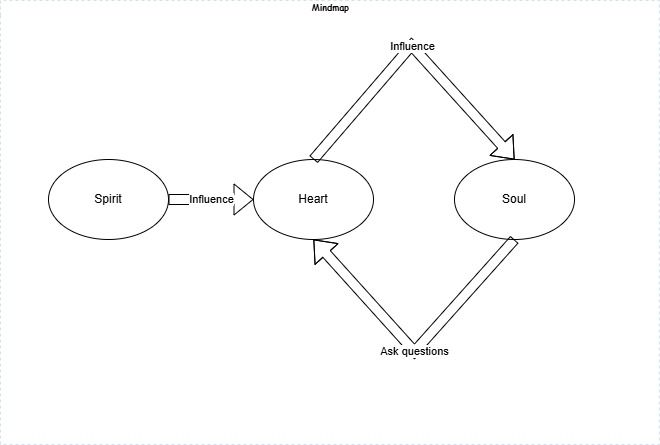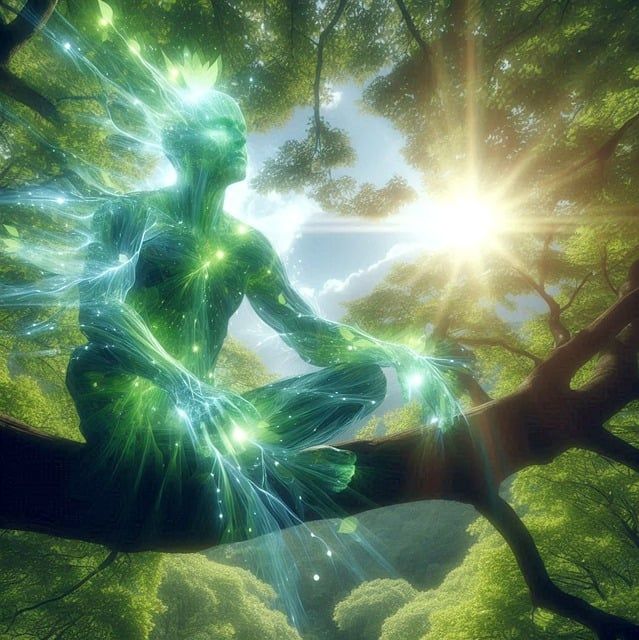What is the difference between the spirit, the heart and the soul? Where between them does art come from?
Since art appeals to and is created by the spirit or heart or soul, or our inner selves, we may ask a question: What is the difference between the spirit, the heart and the soul? And which of these parts of our being produces art? Which parts appreciates it?
The spirit
Firstly the spirit - what is it? The Oxford dictionary gives us two meanings which could be relevant. Firstly:
'The immaterial aspect of a person, considered as a separable part of a person (which persists after death); esp. (in Christian context)'.
Secondly:
'The animating intelligence or sentient element or aspect of a person, as the seat of action and reason'.
The former definition, where the spirit persists after death, only works if one believes in God and the afterlife. John Paul Sartre, the French existentialist and atheist believed that the spirit is something which people choose to believe or not believe in, but there is no proof of its existence. Since I am not aware of any art made by people after they had died, I will exclude this definition of the spirit for our purposes. By definition it is impossible to know if anything of our consciousness persists after death.
There is also an idea that the spirit is some sort of primordial natural force within us and perhaps all living things. It is different from the soul which is the structure of our consciousness. The spirit drives us whereas the soul enables us to reflect. The soul can think about the spirit but not vice versa. The spirit might even be in some ways blind - the will to live? Seen another way is the spirit born of nature and the soul born of humanity?
If we take emotions out of our core what is left? Basal instincts such as find food, find shelter and mate? This approximates to Maslow's hierarchy of needs. This may be the spirit.
Maybe it is only after the spirit has driven us to find food, shelter and a mate that we can think of art?
The heart
When we say the heart we do not mean the beating physical heart. We mean more the Oxford Dictionary definition as
'The seat or repository of a person's inmost thoughts, feelings, inclinations, etc.; a person's inmost being; the depths of the soul; the soul, the spirit.'
Starting there, what distinguishes the heart from the soul? Again the Oxford Dictionary gives us a definition of the heart:
'The seat of a person's emotions, feelings, or thoughts; the moral or emotional part of a person's nature; the central or inmost part of a person's being'.
We have discussed that the spirit may in fact be the 'innermost part of a person's being'. But the spirit may be so primordial as to be invisible, but present.
So maybe the heart is our morality - the mediator between the soul with its complex thoughts and motives, and the natural driving force of the spirit. Perhaps the heart interprets the driving forces of the spirit. For example how to find food to eat - the selfish heart would simply take food from others, the cooperative heart would ask others to help to grow and find food together.
It seems that the heart can also be seen as a synonym for either the spirit or the soul, depending on the culture from which this question is viewed. But if the soul is our emotions, it seems that the heart is something more fundamental.
We are often told to 'do what our heart tells us'. Or to 'go with our gut feeling'. Perhaps this is another way of describing the influence of the heart.
The soul
The soul is defined by the Oxford Dictionary as:
the spiritual part of a person, believed to exist after death He believed his immortal soul was in peril.
Meanwhile the Cambridge Dictionary defines the soul as:
the spiritual part of a person that some people believe continues to exist in some form after their body has died, or the part of a person that is not physical and experiences deep feelings and emotions.
Another view is articulated by modern secular thinkers. It is claimed here that the soul is simply the root of our consciousness. This does seem to make sense, and is a riposte to the religious view that the soul can only be accessed through religious faith. The religious definition of the soul on the contrary seems to imply that the non-religious have no souls.
We can therefore see the soul as our emotions, our thinking, our consciousness, which may be influenced by and can reflect upon the spirit and the heart.
The relationship between spirit, heart and soul
So we could have a working model here. The spirit is our basic driving force as living creatures. The heart is our morality and mediates between spirit and soul. The soul does the thinking and reflecting.
The spirit influences the heart which influences the soul. But the soul cannot influence the spirit and cannot instruct the heart, though it can refer back to the heart. In the end the spirit and the heart influence the soul but not the other way round. The spirit is simply there - put there by nature and evolution or God depending on your view.
Are these three elements our collective being?

If all of this is our being then which part creates and consumes art?
Where does art come from?
So where in our being does art come from?
If the spirit is the base part of our being, put there by nature herself, one wonders if the spirit can be responsible for art. Perhaps not, since it is primordial, not reflective and not itself conscious. Yet is does influence the heart and the soul, so might contribute to the subconscious forces behind art.
The heart with its morality is more likely to influence art, since art often reflects the morality or lack of it, of the artist.
The soul seems more likely to be the source of much of art, since it is reflective and actively thinks about decisions made by the artist during the creation of art.
John Lennon once said that rock and roll 'bypasses the brain' and goes 'to the gut'. There is an element of truth in this which applies to all the branches of the arts. It explains why advertising, no matter how clever, is rarely art. It explains why art dictated by totalitarian governments may not be art. It explains why big budget cinema, or super-commercial corporate pop music, does not have the essence of art.
In the end it could be that the soul manages the production of art, but is influenced by the heart and even some of its course set by the spirit. That would explain the mystery of art, and why philosophers have struggled to define it.







